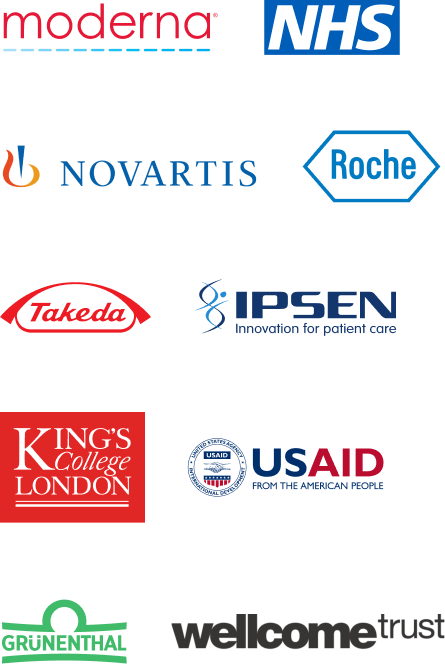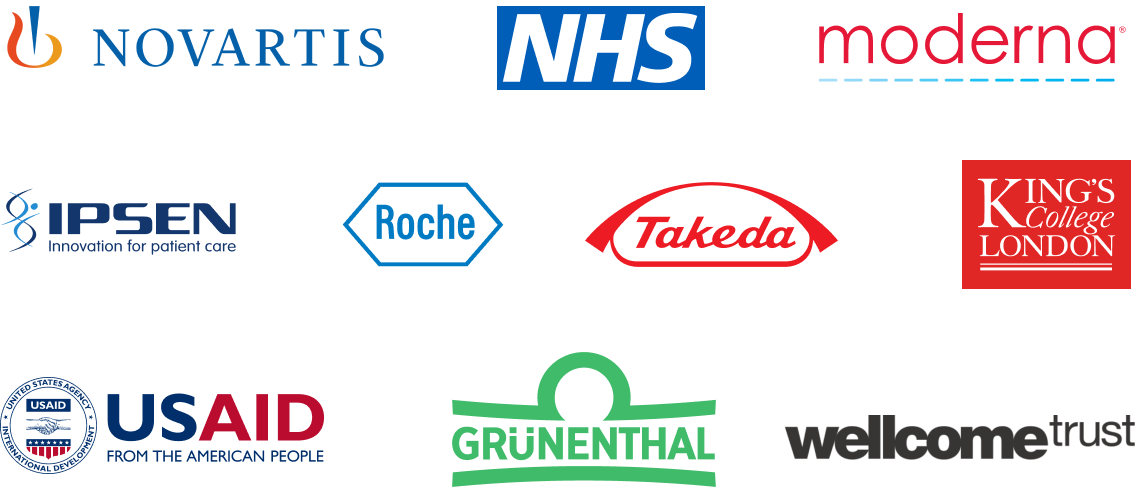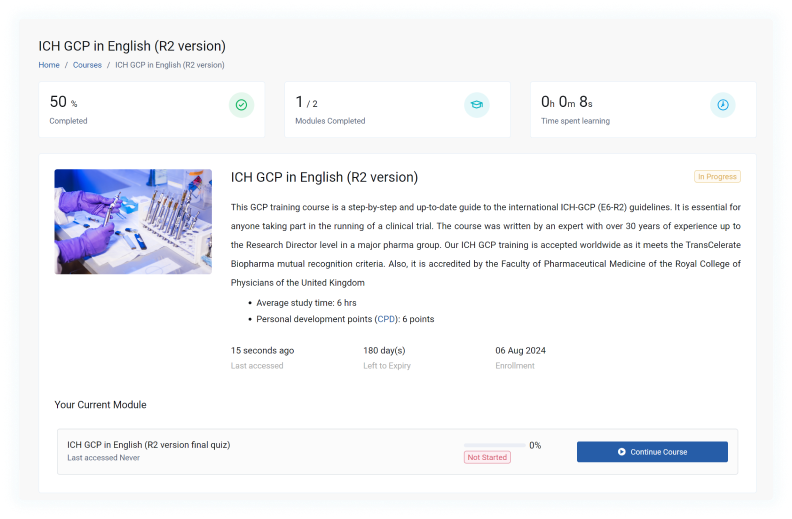Course Syllabus
- Introduction
- What is GCP?
- Why is ICH GCP Important?
- The Principles of ICH GCP
- Additional Learning Points
- Documentation and Version Control
- Quality Assurance (QA)
- Key Resources
- Introduction
- Responsibilities of the CA
- Responsibilities of the IEC
- Subject Informed Consent Forms (ICF): Part 1
- Subject Informed Consent Forms (ICF): Part 2
- Composition, Functions, Operations, Procedures, and Records
- Introduction
- Investigator Responsibilities
- Investigator Qualifications and Agreements
- Adequate Resources
- Medical Care of Trial Subjects: Part 1
- Medical Care of Trial Subjects: Part 2
- Communication with IRB/IEC
- Compliance with the Protocol
- Investigational Medicinal Products
- Randomisation Procedures and Un-blinding
- Informed Consent of Trial Participants
- Informed Consent of Trial Participants: The Consent Discussion
- Informed Consent of Trial Participants: Obtaining Consent Subjects Who Cannot Read or Write
- Informed Consent of Trial Participants: Obtaining Consent of Minors and “Mentally Incompetent” Subjects
- Informed Consent of Trial Participants: Obtaining Consent and Incapacitated Subjects
- Informed Consent of Trial Participants: Updating Consent
- Records and Reports: Introduction
- Records and Reports: Study Site Files
- Records and Reports: Updates & Amendments
- Records and Reports: Source Documents
- Records and Reports: Financial Information
- Records and Reports: The Case Record Form
- Records and Reports: Recording Subject Data
- Premature Termination or Suspension of a Trial
- Progress Reports and Final Reports by Investigator
- Archiving
- Introduction
- Quality Management: Part 1
- Quality Management: Part 2
- QA and QC (Quality Assurance and Quality Control): Part 1
- QA and QC (Quality Assurance and Quality Control): Part 2 – Standard Operating Procedures (SOPs)
- QA and QC (Quality Assurance and Quality Control) – Contracts and Agreements
- Contract Research Organisations
- Medical Expertise
- Trial Design
- Trial Management: Part 1
- Trial Management: Part 2
- Data Processing: Part 1
- Data Processing: Part 2 - Electronic Data Systems
- Record Keeping
- Investigator Selection: Introduction
- Investigator Selection: Permissions
- Investigator Selection: Responsibilities
- Investigator Selection: Compensation
- Financing
- Notification/ Submission to Regulatory Authorities
- Gaining CA Approval in the EU
- Confirmation of Review by IRB/IEC
- Information on Investigational Medicinal Products (IMPs)
- Manufacturing, Packaging, Labelling, and Coding Investigational Products: Part 1
- Manufacturing, Packaging, Labelling, and Coding Investigational Products: Part 2
- Supplying and Handling Investigational Products
- Record Access
- Audit and Inspection
- Noncompliance
- Premature Termination or Suspension of a Trial
- Clinical Trial/Study Reports
- Multicentre Trials
- Introduction
- Monitoring: Part 1
- Monitoring: Part 2 – Monitor Responsibilities
- Monitoring: Part 3 - The Monitoring Visit
- Monitoring: Part 4 – Verification of Investigational Medicinal Products (IMP)
- Complying with the Protocol, Amendments, SOP and Guidance
- Verifying Informed Consent
- The Case Record Form (CRF) and Source Documents
- Verifying Subject Data
- Errors
- Closing out the Monitoring Visit
- The Monitoring Report & Plan
- Quality Management - Centralised Monitoring
- Fraud and Misconduct
- Introduction
- Adverse Drug Reaction Reports: Part 1 – Adverse Events (AEs)
- Adverse Drug Reaction Reports: Part 2 – Serious Adverse Events
- Adverse Drug Reaction Reports: Part 3 – Suspected Unexpected Serious Adverse Reactions (SUSARs)
- Adverse Drug Reaction Reports: Part 4 – Adverse Events of Special Interest
- Adverse Drug Reaction Reports: Part 5 – Periodic Safety Reports
- Adverse Drug Reaction Reports: Part 6 – Reporting Decision Tree
- Introduction
- Protocol Structure and Content
- Introduction
- Investigator Brochure Structure and Content
- Introduction
- Essential Documents
- Archiving
- Documents to be Present Pre-Study
- Documents to be Present During the Study
- Documents to be Present Post-Study
- Glossary & Abbreviations
- Useful Reference Documents List
Our GCP certified customers


Good Clinical Practice (GCP) training is a vital educational programme designed for professionals involved in clinical research. It provides comprehensive instruction on the ethical and scientific standards that are fundamental to conducting high-quality clinical trials. This training is based on the globally acknowledged guidelines set forth by the International Council for Harmonisation (ICH).
The key objectives of GCP training include:
- Safeguarding the rights, safety, and wellbeing of human participants
- Upholding the accuracy and reliability of data collected during clinical trials
- Fostering uniform, top-tier practices across all facets of clinical research
Whitehall Training's Good Clinical Practice Course thoroughly explores these crucial areas, offering participants a robust understanding of both the theoretical principles and practical applications of Good Clinical Practice. Our course ensures that learners are well-equipped to navigate the complexities of clinical research while adhering to the highest standards of ethical and scientific conduct.
For those involved in clinical trials research, GCP certification is essential.
If you're keen to broaden your knowledge of the field, obtaining GCP certification is tremendously advantageous because it:
- Guarantees adherence to global standards
- Boosts the credibility and calibre of research
- Safeguards the rights and well-being of study participants
- Enhances career opportunities within clinical research
The Whitehall Training GCP course not only offers certification but also imparts practical know-how for effectively implementing GCP principles in your professional endeavours.
GCP certification is crucial for numerous professionals involved in clinical research:
- Trial Investigators: This includes both lead investigators and co-investigators who are accountable for the execution of trials at research locations.
- Clinical Research Team Members: Encompassing research coordinators, trial nurses, and other on-site personnel who play a role in managing the study.
- Sponsors and CROs: Individuals responsible for overseeing the planning, commencement, and documentation of trials.
- Regulatory Bodies: Officials tasked with supervising and assessing trial compliance.
- Ethics Committees and IRBs: Those who review and grant approval for trial protocols.
- Staff at Research Institutions and Universities: Ensuring that institutional research adheres to global standards.
- Researchers Funded by the NIH: All staff and investigators participating in clinical trials supported by NIH funding.
Whitehall Training's Good Clinical Practice Course is designed to accommodate this broad spectrum of professionals, offering both role-specific knowledge and fundamental GCP principles. The course is also beneficial for individuals seeking to enhance their research capabilities and refine their clinical trial operations.
Our Good Clinical Practice (GCP) course provides comprehensive coverage of the ICH-GCP (E6-R2) international guidelines, fulfilling the training requirements for participation in global clinical trials. We offer this course in multiple languages to cater to a diverse audience.
This in-depth training serves as a contemporary, step-by-step guide to the ICH-GCP (E6-R2) guidelines, making it an indispensable resource for all individuals involved in clinical trial management and execution.
The course content has been developed by an industry veteran with over three decades of experience, including a stint as Research Director at a prominent pharmaceutical company. Our training has received accreditation from the Faculty of Pharmaceutical Medicine of the Royal College of Physicians of the United Kingdom, underscoring its quality and relevance.
To accommodate our international learners, we've made the course available in ten languages: English, German, Bulgarian, French, Italian, Japanese, Polish, Portuguese, Russian, and Spanish. Additionally, we've crafted regional variants of the course to align with the specific regulatory landscapes in Australia, the UK, the US, France, Germany, and Latin America.
Our GCP course boasts a user-friendly design with clear, visually engaging content, facilitating easy cross-referencing with the ICH-GCP E6 document. Drawing from the author's extensive industry experience, the course offers practical insights into the real-world application of Good Clinical Practice principles. Upon completion, participants can earn 6 Continuing Professional Development (CPD) points, further enhancing their professional credentials.
Indeed, our GCP course has received accreditation from a prestigious body in the UK. The Faculty of Pharmaceutical Medicine at the Royal College of Physicians has given its stamp of approval to our programme. This organisation is well-known in the pharmaceutical industry, having established itself as a leader in setting comprehensive research standards since its inception in 1989.
The Faculty's accreditation of our course serves as a testament to its quality and relevance. It signifies that the content and delivery of our GCP training meet the exacting standards set by this professional body for pharmaceutical physicians in the United Kingdom.
By completing our accredited course, you'll gain a qualification that is widely respected within the industry. This recognition can be particularly valuable for professionals seeking to demonstrate their commitment to maintaining high standards in clinical research practices.
The price of GCP certification can fluctuate based on several key elements:
- Endorsement: Has the course received approval from recognised bodies?
- Qualification: Does the training fulfil ICH standards, allowing participants to engage in global clinical studies?
- Content standard: Is the material current and authored by a subject matter expert?
- Duration of availability: For how long can students access the course materials?
Our Whitehall Training GCP course is priced at £79, reflecting its high-quality attributes:
- Endorsement: The Royal College of Physicians has accredited the course, awarding 6 CPD points.
- Qualification: Upon completion, learners are equipped to take part in clinical trials, in line with ICH E6(R2) guidelines.
- Content standard: The course material is crafted by our GCP specialist, Lucy Parker, who brings over ten years of experience managing research across major institutions, including the NHS.
- Duration of availability: We support ongoing professional development by offering unlimited access to our course resources.
Are you purchasing for a group? A 10% discount is automatically applied at checkout for orders of 5 licences. For larger group bookings, please contact our team to discuss bespoke pricing options.
Indeed, some GCP training programmes can be accessed without charge, but it's important to be aware of their potential drawbacks:
- The material may be of inferior quality (lacking accreditation) and not up-to-date
- They typically don't offer an official certificate, which is essential for researchers to participate in clinical studies
Nevertheless, these free options can serve as a useful primer for individuals seeking a foundational grasp of GCP principles and concepts. They may be suitable for those simply looking to familiarise themselves with the basics of Good Clinical Practice.
It's worth noting that Whitehall Training's Good Clinical Practice Course addresses these limitations, providing high-quality, accredited content and official certification upon completion. This ensures that researchers are fully equipped and authorised to conduct clinical research.
Our GCP training programme offers a comprehensive exploration of the essential principles and practices required for conducting ethical and scientifically rigorous clinical trials. The course is structured to accommodate learners at various levels, featuring both foundational and advanced components.
The curriculum encompasses a wide range of crucial subjects, including:
- The historical context and fundamental principles of GCP
- Defining the duties of investigators, sponsors, and monitors
- Ethical considerations and the process of obtaining informed consent
- Creating and adhering to trial protocols
- Managing safety reports and adverse events
- Ensuring data integrity and implementing quality management systems
- Understanding regulatory requirements and interacting with authorities
- Maintaining essential documentation and records
- Proper handling of investigational medicinal products
- Effective site management and monitoring techniques
Our training utilises a variety of engaging e-learning methods to ensure an effective and immersive learning experience. These approaches include:
- In-depth educational content
- Authentic case studies and scenarios drawn from real-world situations
- Engaging knowledge assessments and quizzes
- Practical examples and industry best practices
- Opportunities for personal reflection and practical application of knowledge
This carefully crafted course aims to equip participants with the necessary skills and understanding to excel in the field of clinical research, adhering to the highest standards of Good Clinical Practice.
Acquiring your Good Clinical Practice certificate involves a simple two-stage process:
- Work through our engaging, interactive course materials to complete the educational component.
- Take the online final assessment.
Feeling apprehensive about the GCP assessment? There’s no need to worry. The exam is merely a necessary step to confirm your readiness for research participation. Should you not succeed on your first attempt, you can easily revisit our comprehensive resource library to brush up on any areas where you need improvement, and then have another go at the assessment.
Remember, our Whitehall Training Good Clinical Practice Course is designed to support you through each stage of this process, ensuring you’re well-prepared for both the exam and your future role in clinical research.
Whitehall Training's Good Clinical Practice course is structured to ensure participants not only absorb the material but can effectively implement it in actual clinical research environments. Our comprehensive evaluation approach includes:
- Continuous Learning Checks: Each module features interactive exercises and real-world scenarios. These serve to solidify crucial concepts and enable learners to evaluate their progress throughout the course.
- Comprehensive Final Evaluation: The programme concludes with an all-encompassing assessment that thoroughly examines the student's understanding of Good Clinical Practice principles and applications. This evaluation covers all key areas explored in the course, such as:
- Ethical protocols in clinical studies
- Adherence to regulatory standards
- Key roles and their responsibilities within clinical trials
- Maintaining data accuracy and quality control
- Management of safety reports and adverse incidents
Real-world Application: The final assessment includes questions designed to evaluate how well learners can apply GCP guidelines to authentic clinical trial situations.
To ensure our participants are thoroughly prepared for conducting trials, attaining a passing score on the final evaluation is essential for GCP certification.
We offer unlimited attempts at the final assessment, allowing learners to achieve the required standard and successfully obtain their GCP qualification.
Our Good Clinical Practice course is tailored to suit a broad spectrum of professionals engaged in clinical research. Whilst prior knowledge of clinical research can be beneficial, it isn’t essential. We’ve carefully structured the content to cater to varying levels of experience and diverse roles within the clinical trial field.
This training is particularly well-suited for:
- Research Nurses
- Clinical Trial Managers
- Principal and Sub-Investigators
- Clinical Research Coordinators
- Quality Assurance Specialists
- Regulatory Affairs Professionals
- Data Managers and Biostatisticians
- Ethics Committee Members
- Pharmacists involved in clinical trials
- Individuals working for sponsors and CROs
Whether you're embarking on your clinical research journey or seeking to update your existing knowledge, our course offers a thorough exploration of GCP principles and their real-world application. We’ve designed it to be accessible and informative, regardless of your current level of expertise in the field.
Yes, our Good Clinical Practice (GCP) course is fully available via the internet, providing learners with unparalleled convenience and adaptability. This digital format offers several key benefits:
- Personalised learning speed: Students can navigate through the course content at a rhythm that best suits their individual needs and timetable. This approach allows for thorough engagement with the material without the constraints often associated with traditional classroom settings.
- Round-the-clock availability: The course can be accessed at any time, from any internet-enabled device. Whether you're at your desk, in your living room, or on the move, you can continue your learning journey.
The International Council for Harmonisation, commonly known as ICH, plays a crucial role in shaping global pharmaceutical research standards, including Good Clinical Practice (GCP). Here are some essential points to understand:
- ICH serves as a collaborative platform, uniting regulatory bodies and pharmaceutical industry experts.
- Its primary function is to establish globally accepted guidelines for clinical research.
- The ICH GCP guidelines are designed to safeguard trial participants and maintain data quality.
- These guidelines undergo regular revisions, with ICH GCP E6(R2) being the most current iteration.
Adhering to these ICH guidelines is essential for conducting clinical trials that meet international standards. This is precisely why our Whitehall Training Good Clinical Practice Course comprehensively covers all 13 fundamental ICH GCP principles. By completing this course, you'll be well-prepared to conduct research that aligns with global requirements.
ICH Good Clinical Practice E6 (R2) is the latest version of the Good Clinical Practice guidelines, published in 2016 by the International Council for Harmonisation of Technical Requirements for Pharmaceuticals for Human Use. This revision marks a significant step forward in GCP standards, adapting to the evolving nature of clinical research.
It's essential for clinical research professionals to be well-versed in ICH GCP E6 (R2) for several reasons:
- These guidelines set the current worldwide benchmark for ethical and scientifically robust clinical trials.
- Adherence to ICH GCP E6 (R2) is typically mandated by regulatory bodies across the globe.
- It plays a vital role in safeguarding trial participants and ensuring the integrity of research data.
- Most research institutions and sponsors expect their teams and collaborators to be knowledgeable about and compliant with these updated guidelines.
The Whitehall Training Good Clinical Practice Course offers comprehensive coverage of ICH GCP E6 (R2). Our training ensures that learners gain a thorough understanding of these revised guidelines and can implement them effectively in their clinical research roles.
The International Council for Harmonisation (ICH) Good Clinical Practice (GCP) guidelines are founded on 13 essential principles that establish the ethical and scientific benchmarks for clinical research. These crucial principles encompass:
- Conducting research ethically
- Ensuring benefits surpass potential risks
- Safeguarding participants' rights and well-being
- Providing comprehensive supporting information
- Developing scientifically robust protocols
- Obtaining approval from ethics committees
- Ensuring qualified medical oversight
- Employing competent investigators
- Acquiring informed consent from participants
- Maintaining precise data documentation and reporting
- Upholding confidentiality standards
- Adhering to good manufacturing practices for investigational products
- Implementing effective quality assurance systems
The Whitehall Training Good Clinical Practice Course offers comprehensive instruction on these fundamental principles. Our programme is designed to equip learners with a thorough understanding of how to implement these guidelines effectively in practical clinical research scenarios. By mastering these principles, you'll be well-prepared to conduct ethical and scientifically sound clinical trials in accordance with ICH GCP standards.

